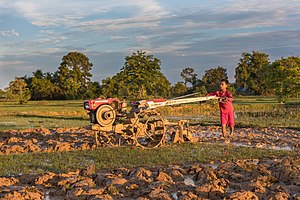
Back علم الاجتماع الريفي Arabic Sociologia rural Catalan Sociologie venkova Czech Agrarsoziologie German Kamparansociologio Esperanto Sociología rural Spanish جامعهشناسی روستایی Persian Sociologie rurale French Sosiologi pedesaan ID 農村社会学 Japanese

| Part of a series on |
| Sociology |
|---|
 |
| Rural area |
|---|
Rural sociology is a field of sociology traditionally associated with the study of social structure and conflict in rural areas. It is an active academic field in much of the world, originating in the United States in the 1910s with close ties to the national Department of Agriculture and land-grant university colleges of agriculture.[1]
While the issue of natural resource access transcends traditional rural spatial boundaries, the sociology of food and agriculture is one focus of rural sociology, and much of the field is dedicated to the economics of farm production. Other areas of study include rural migration and other demographic patterns, environmental sociology, amenity-led development, public-lands policies, so-called "boomtown" development, social disruption, the sociology of natural resources (including forests, mining, fishing and other areas), rural cultures and identities, rural health-care, and educational policies. Many rural sociologists work in the areas of development studies, community studies, community development, and environmental studies. Much of the research involves developing countries or the Third World.
- ^ Nelson, 1969